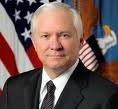
WASHINGTON (AFP) – US Defense Secretary Robert Gates confirmed Monday plans to leave office next year, saying he first wanted to make sure the start of the American withdrawal from Afghanistan is on track.
“I think that by next year I’ll be in a position where — you know, we’re going to know whether the strategy is working in Afghanistan,” Gates said in an interview with the American magazine Foreign Policy.
“We’ll have completed the surge. We’ll have done the assessment in December. And it seems like somewhere there in 2011 is a logical opportunity to hand off.”
Gates said it would be wrong for him to wait until January 2012 to try and hand over the reins as it could be tricky to “get a good candidate” in an election year when the administration might be voted out.
“I just think this is not the kind of job you want to fill in the spring of a presidential election. So I think sometime in 2011 sounds pretty good.”
Gates himself was first appointed defense secretary by former president George W. Bush and as a senior Republican figure has provided valuable political cover in President Barack Obama’s Democratic administration.
The confirmation of his planned departure comes at a critical time for the Afghanistan war effort with a surge of 30,000 more US troops due to swell American numbers to 100,000 in the coming weeks.
Afghanistan, with the help of its Western backers, is trying to build up its army and police so that they can take responsibility for security from US-led NATO forces by the end of 2014.
The Taliban, toppled in a 2001 US-led invasion for harboring Osama bin Laden, the Al-Qaeda chief who masterminded the September 11, 2001 attacks, still control large swathes of the south and have put up stiff resistance.
US public support for the near nine-year war and Obama’s handling of it are at an all-time low, according to opinion polls here, while the death toll for American troops hit a record monthly high in July of 66.
Obama announced his new Afghan strategy late last year and as well as the initial surge said he would start pulling American troops home in July 2011.
The deadline has been strongly criticized by some who believe it sent out the message America is not in the fight for the long-term and boosted the Taliban’s resolve to wait it out.
Others attack him for not pulling out troops fast enough as they believe US and NATO forces are bogged down in an unwinnable conflict.
Gates told Foreign Policy he believed Obama’s surge meant things were on track for the withdrawal deadline, which he agreed with.
“The July 2011 deadline was a hard hurdle for me to get over because I’d fought against deadlines with respect to Iraq consistently,” he said.
“But I became persuaded that something like that was needed to get the attention of the Afghan government, that they had to take ownership of this thing…. And I recognized the risks.”
Gates was credited with deftly steering US forces toward the exit in Iraq, disarming critics in Congress even while undertaking an unpopular but ultimately successful 30,000 troop surge there.
Obama is the seventh president Gates, 67, has served in a 40 year career at the heart of the US national security apparatus, mostly as a Cold War hawk at the Central Intelligence Agency where he served as director in 1991.
The Foreign Policy report said there was much speculation about who might replace him.
It mentioned Michele Flournoy, the current under secretary of defense for policy, John Hamre, president of the Center for Strategic and International Studies, CIA Director Leon Panetta, and former Navy Secretary Richard Danzig, as possible candidates.
ATTENTION READERS
We See The World From All Sides and Want YOU To Be Fully InformedIn fact, intentional disinformation is a disgraceful scourge in media today. So to assuage any possible errant incorrect information posted herein, we strongly encourage you to seek corroboration from other non-VT sources before forming an educated opinion.
About VT - Policies & Disclosures - Comment Policy



